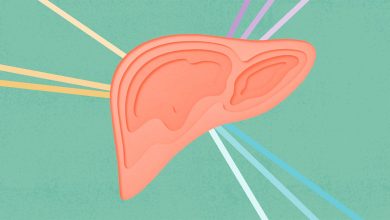Exercise Improves Heart Health by Decreasing Stress, Study Finds

[ad_1]
Researchers found that the heart-protective benefits of physical activity nearly doubled in people with a history of depression. “Exercise was more than twice as potent at reducing heart attacks and strokes among individuals with a history of depression,” says senior author Ahmed Tawakol, MD, a researcher and cardiologist in the Cardiovascular Imaging Research Center at Massachusetts General Hospital in Boston. The effect that exercise has on the brain’s stress-related activity may be behind this new finding, says Dr. Tawakol.
Chronic Stress Can Be as Damaging to Heart Health as Smoking or High Blood Pressure
Why? It all starts in an area of your brain called the amygdala, which is like your body’s alarm system. When you’re facing a stressful situation, like a big presentation or a neighbor’s dog that just won’t stop barking, your amygdala kicks into high gear.
That’s because when the amygdala is constantly on alert, it starts to send out distress signals throughout your body. These signals can trigger inflammation in your arteries, the tubes that carry blood to your heart. Over time, this inflammation can lead to heart problems like heart attacks and strokes.
Getting the Recommended Amount of Physical Activity Lowered the Risk of Heart Attack and Stroke by 23 Percent
To better understand how physical activity impacts the stress-related brain activity and what role that plays in heart disease risk in people with and without depression, researchers analyzed medical records and other information of 50,359 participants from the Mass General Brigham Biobank who completed a physical activity survey. A subset of 774 participants also underwent brain imaging tests and measurements of stress-related brain activity.
Over a median follow-up of 10 years, nearly 13 percent of participants developed cardiovascular disease. The participants who met physical activity recommendations of at least 150 minutes of moderate exercise per week or 75 minutes of vigorous activity per week had a 23 percent lower risk of developing cardiovascular disease compared with people who didn’t exercise that much.
“In the participants without depression, reductions in heart attack risk plateaued at around 300 minutes of moderate intensity exercise per week. That observation has been seen over and over and over in the literature,” says Tawakol. That’s why our current physical activity guidelines recommend 150 to 300 minutes of moderate intensity exercise per week to achieve optimal reductions in our heart attack risk, he says.
Physical Activity Reduces Heart Attack and Stroke Risk by Managing Stress in the Brain
The improvements in stress-related brain activity could be driven by reductions in the amygdala or increases in the prefrontal cortical activity, he says.
If you liken the amygdala to a gas pedal for stress hormones, the prefrontal cortex is like the brakes. When you’re stressed, the gas pedal gets pushed down, revving up your body’s fight-or-flight response, but the brake (prefrontal cortical activity) helps you ease off the gas.
“In other words, exercise is driving up cortical activity while driving down amygdala activity,” says Tawakol.
That led researchers to the next question: Is the effect even more powerful in people with chronic stress or depression? If exercise plays a role in heart health through the brain by keeping stress-related brain activity in check, then the benefits of exercise should be even stronger among individuals with higher stress, explains Tawakol.
Exercise Offers Double Heart Protection for People With Depression
Although researchers expected more benefit for people with preexisting depression, they were surprised to find it led to double the protection against heart attacks and strokes. “It was really substantial in these individuals,” he says.
Researchers found another key difference: Although the heart benefits for exercise leveled off at 300 minutes per week for people without depression, there was no plateau for people with depression. In that group, additional time exercising, even beyond 300 minutes, led to continued gains, says Tawakol. Researchers believe that finding could be because people with chronic stress or preexisting depression have a higher level of stress-related brain activity at baseline.
“These findings suggest that physical activity could be especially helpful for cardiovascular risk management in people with a history of depression, and those with greater experiences or perceptions of life stress,” says Allison E. Gaffey, PhD, an assistant professor of medicine at the Yale School of Medicine in New Haven, Connecticut, who was not involved in the study.
Future studies are needed to further explore the relationship between physical activity, stress, and the brain and to prove that exercise is causing the reductions in risk observed in the study, according to the authors.
Exercise Does a Brain Good — Both in the Moment and in the Long Run
These findings provide additional support for more uniform screenings of stress and related psychological conditions, like depression, as part of heart disease prevention, says Dr. Gaffey. “For example, perhaps those with high stress or a history of depression could be given more support around engaging in regular physical activity,” she says.
If these findings are confirmed in other studies, it could also lead to changes around the guidelines for exercise in people with depression, says Tawakol.
In the meantime, people should know that physical activity may have important brain effects, which may provide greater heart benefits in people with stress-related conditions such as depression, says Tawakol.
These additional beneficial aspects may motivate people to exercise further because they have a better understanding of what they’re gaining, he says.
And those include both “in the moment” and long-term advantages. “You’re feeling better because you have your endorphins that are a ‘flash in the pan’ — you enjoy that while you’re exercising. But physical activity is also structurally changing your brain, which is associated with even more heart-protective benefits,” says Tawakol.
[ad_2]




